From meteorologists who predict and track the weather to geologists who uncover our planet’s history, there is a whole world of unique specializations and jobs waiting in the realm of nature science. But landing a job in this exciting field wouldn't be possible without an outstanding nature scientist resume.
Follow our comprehensive guide and discover valuable writing tips, customizable templates, plenty of examples, and resume samples submitted by industry professionals.
In this guide, we cover the key steps to writing a job-winning resume as a nature scientist. keep reading to learn how to:
- Select a resume format that matches your experience level
- Write an effective resume summary as a nature scientist
- Include a diverse range of nature scientist skills
- Describe your work experience with clear and quantifiable details
- List your education as a nature scientist correctly
- Access top resources for job-seeking nature scientists
Still looking for a job? These 100+ resources will tell you everything you need to get hired fast.
1. Select the best format for your nature scientist resume
Applying to positions within scientific or academic fields presents you with a tough question upfront: do you write a short-form or long-form resume?
Short-form resumes often come in the form of the reverse-chronological resume, a one-page format that focuses primarily on work and field experience. This format is well suited for applicants who are applying for entry to mid-level nature science positions.
Alternatively, a long-form resume is known as a Curriculum Vitae (CV) and allows the applicant to include far greater detail in each section. Not only will the applicant provide thorough details about their past jobs but they will also include much more in-depth descriptions for their education, skills, and all other sections as well.
The CV is better suited for higher-level positions, such as a Lead Scientist in a lab or a Professor of Science at a university.
Of course, not every job requires a CV – in fact, most outside of formal science and academia won’t. Therefore, it’s always important to read job postings carefully and identify what application materials they specifically ask for.
Choose your preferred template and make your resume shine.
2. Write an effective resume summary as a nature scientist
A resume summary is an introductory statement at the beginning of a resume.
In this summary – which should be between one to three sentences in length – an applicant should strive to include the most important professional details about themselves. This can include academic credentials, awards, and key accomplishments.
To help show the difference between a strong and weak resume summary, below is an incorrect example, followed by a correction and explanation:
Incorrect nature scientist resume summary example
Nature Scientist with many years of experience working in natural health. Talented medicinal researcher, helping to develop several new dietary supplements for specific health conditions. Interested in expanding knowledge of human health and natural treatments further.
Why is this incorrect? In this example, the applicant is right to begin describing their specialized knowledge, as this can help set them apart from the competition. However, as they go into greater detail, they lose all specificity and context, making this summary confusing or uninteresting to employers.
Corrected nature scientist resume summary
Devoted Nature Scientist with 5+ years of experience working in natural and holistic healthcare. Highly skilled at researching and developing holistic medicinal alternatives and dietary supplements for patients with Chron’s disease and IBS. Performed a study on 200+ participants using a new supplement formula, resulting in a significant reduction of symptoms in 72% of participants over 30 days.
Why is this correct? In this corrected example, the applicant provides much more information regarding not only their specialization but also specific accomplishments from within the field. They offer exact figures and contextual details to give the employer a clear idea of what they are most passionate about and talented in.
3. Include a diverse range of nature scientist skills
Working in a scientific role involves many technical skills – the abilities you have gained through your rigorous studies and academics. However, interpersonal skills are equally as important to showcase on a resume, as they reveal to employers your ability to comprehend the people and world around you.
As such, it is essential to include a variety of both technical and interpersonal skills on your nature scientist resume. To help you brainstorm these skills, here are 10 examples of each that are specific to nature scientists:
The best technical skills to put on your nature scientist resume
- Conducting research & experiments
- Laboratory safety standards
- Knowledge of laboratory equipment
- Data collection & analytics
- Scientific report writing
- Field specializations (meteorology, geology, astronomy, etc.)
- Project management
- Quality control methods
- Knowledge health & biology
- Knowledge of environmental law
Effective interpersonal skills for your nature scientist CV
- Analytical thinking
- Collaboration & cooperation
- Strong verbal & written communication
- Active listening
- Problem-solving
- Creativity
- Adaptability
- Leadership
- Compassion
- Attention to detail
4. Describe your nature scientist work experience with clear and quantifiable details
The work history section of your resume offers you the best opportunity to show off your hands-on scientific experience.
When describing your past positions, it’s important to not overcrowd each entry with blocks of text. Instead, use bullet points and short sentences to describe the most relevant and eye-catching details. Whenever possible, strive to include quantifiable figures or notable accomplishments you achieved during your time in the position.
Here is an example of a work experience entry from a nature scientist resume
Atlanta Botanical Gardens, Atlanta, GA
Nature Scientist
December 2017 to March 2020
- Oversaw the production, fertilization, and maintenance of the garden displays.
- Developed a new color variation of a poppy that was used to create a unique seasonal display exclusive to Atlanta Botanical Gardens.
- Created educational videos for students ages K-12 teaching the importance of conservation, how to grow and care for plants, and identifying trees and plants in the wild.
5. List your education as a nature scientist correctly
Like with the format you select, the way you describe your education on your resume will depend on both your academic history and your professional goals.
If you’re applying for a higher-level academic or scientific position, you’ll likely need the larger education section that a CV can provide. However, for entry to mid-level positions in various nature science niches, sticking to a simple and concise education section on a reverse-chronological resume may be preferable.
No matter which format you are using, make sure to include the following information within the education section of your resume:
- The name(s) of your degree(s)
- The university you attended
- The date of graduation (if you graduated with honors, it can be useful to note this next to your date of graduation)
Here is an example of a well-crafted education section on a nature scientist resume
The University of North Carolina at Chapel Hill, Chapel Hill, NC
M.S. in Environmental Science
- Graduated: 2015, Magna Cum Laude
The University of North Carolina at Asheville, Asheville, NC
B.S. in Natural Science
- Graduated: 2013
6. Valuable job search resources for nature scientists
So, now you're more than well-equipped to handle your resume, but do you know where to look for work opportunities? If you're unsure of where to start, you can draw inspiration from our list of resources:
- Job boards for nature scientists: For positions in scientific and academic institutions, search through websites like Earthworks-Jobs, Nature Careers, ChronicleVitae, or jobs.ac.uk.
- General job search boards: But platforms that don't cater to your professional area only, such as Indeed, Glassdoor, or Monster, can also yield compelling results.
- Research projects: If you're looking for grants or support for your research projects, try exploring websites of the European Research Council (ERC), the National Science Foundation (NSF), or the United Nations Environment Programme (UNEP).
- Professional associations: These organizations offer a wealth of resources for nature scientists like yourself. For example, check out the International Union of Biological Sciences (IUBS), the Australian Society for Fish Biology (ASFB), or the British Ecological Society (BES).
- Consulting firms and environmental consulting companies: Consulting firms specializing in environmental science, ecology, and biodiversity assessment, such as ERM or SLR Consulting, may hire nature scientists for project-based work.
- Continuous learning: Do you need further knowledge of data analysis and visualization? Or work on your presentation skills? With courses offered by Coursera, Udemy, and edX, you'll expand your skill set with ease.
Job searching in the field of nature science often involves navigating through a competitive landscape with limited job openings. However, with persistence, networking, and showcasing relevant experience and qualifications with your nature scientist resume, the right opportunities can be found.
Nature Scientist Resume FAQ
How can I best showcase my skills and experience as a nature scientist on my resume?
Always tailor your resume to highlight your relevant skills and experience in the field of nature science. Focus on technical skills such as field research, data analysis, and laboratory techniques, as well as soft skills like critical thinking, problem-solving, and communication. To give more weight to your achievements, use concrete examples and quantifiable data to demonstrate your proficiency and impact in previous roles.
What can I do to stand out from other candidates in the competitive field of nature science?
The best thing you can do is emphasize any specialized training, certifications, or unique experiences that set you apart from other candidates. For example, you can highlight your contributions to research projects, publications, presentations, and collaborations within the field. Additionally, showcase your passion for nature science through relevant volunteer work, extracurricular activities, or professional affiliations.
How can I effectively use keywords to optimize my nature scientist resume for ATS?
First of all, you need to research keywords relevant to your field of nature science and incorporate them strategically throughout your resume. Use terms commonly found in job descriptions, industry publications, and professional profiles to increase your chances of passing through ATS scans. However, prioritize readability and relevance over keyword stuffing, and ensure your resume remains tailored to human readers as well.
How can I format my nature scientist resume to make it visually appealing and easy to read?
Opt for a clean and professional resume format with clear headings, bullet points, and appropriate amount of white space. Also, use a legible font and consistent formatting throughout the document. If you want to save yourself some time and energy, feel free to pick one of our very own resume templates.
What about my fieldwork experience? How can I write about it on my nature scientist resume?
Write about your fieldwork experience by including specific details such as the location, duration, objectives, and outcomes of your fieldwork projects. Emphasize your role in planning, executing, and analyzing field studies, as well as any relevant skills or techniques utilized in the field. Additionally, you can mention any publications, presentations, or reports resulting from your fieldwork.

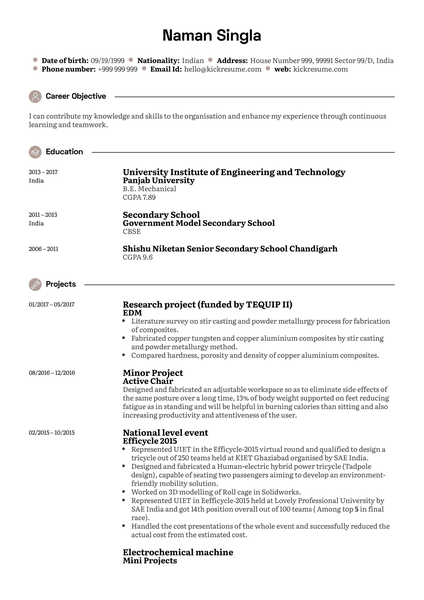
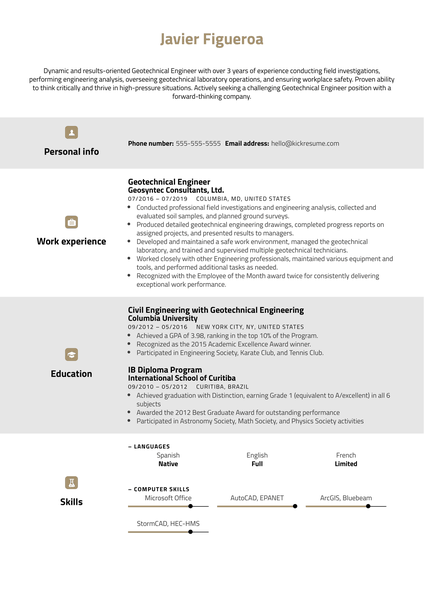

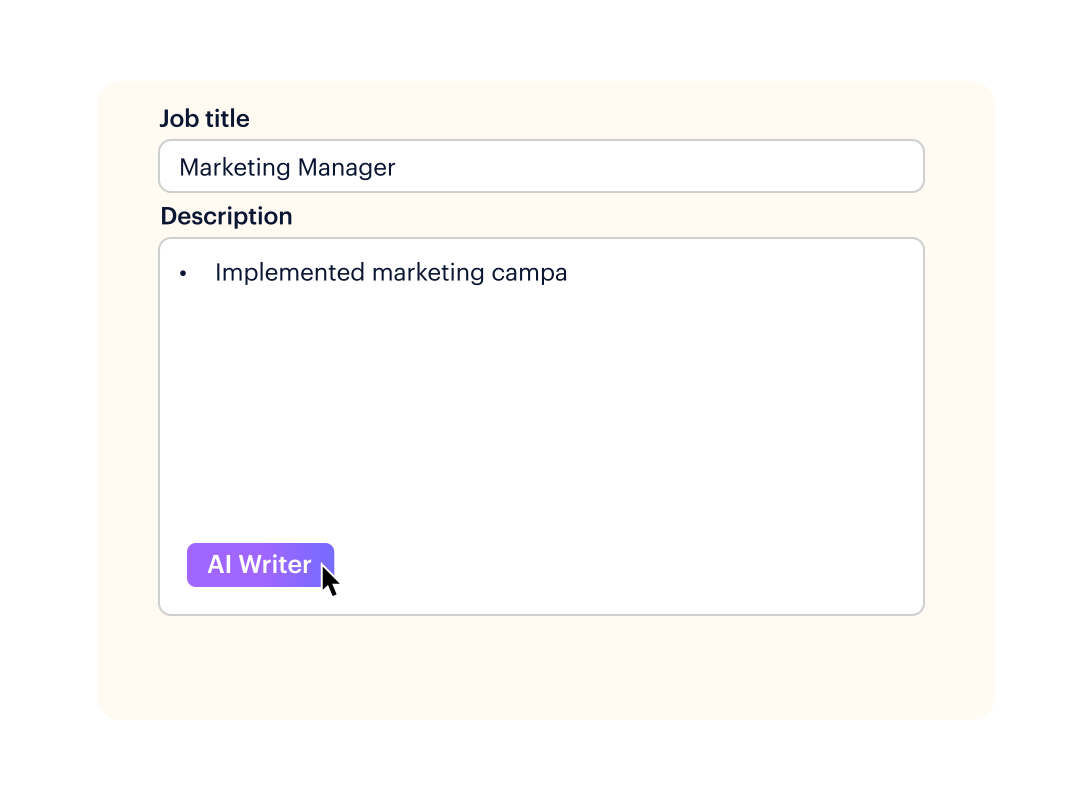

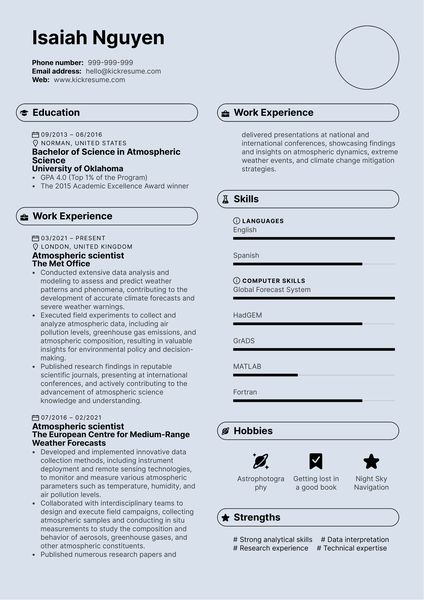
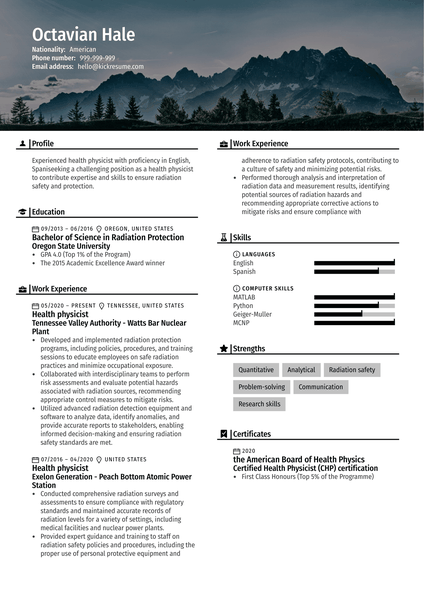
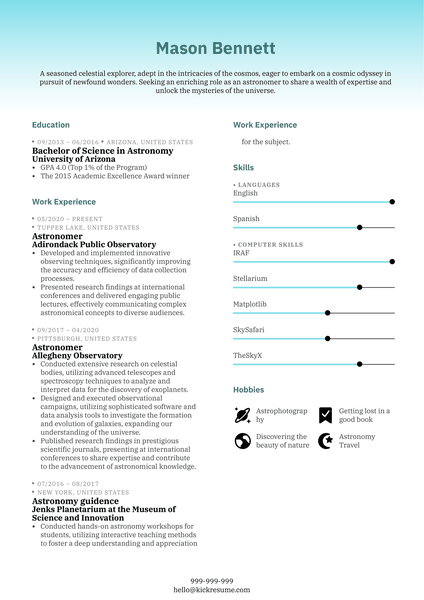
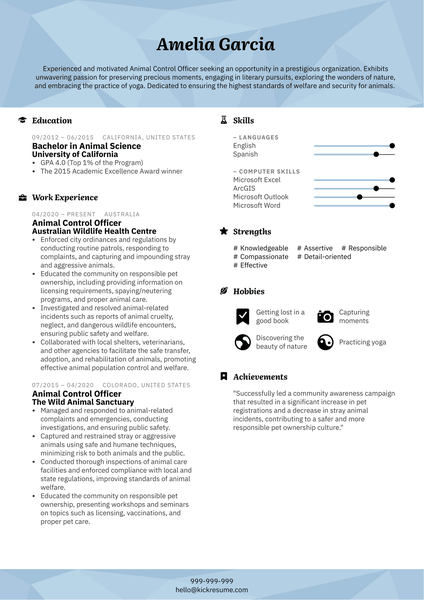
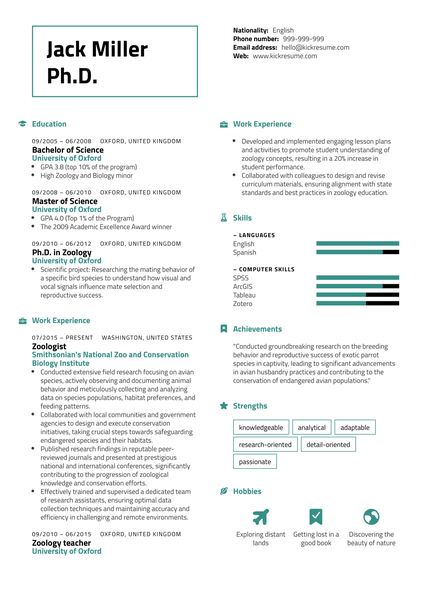
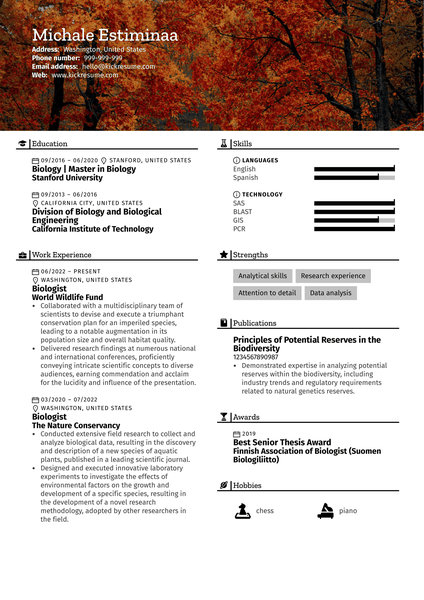
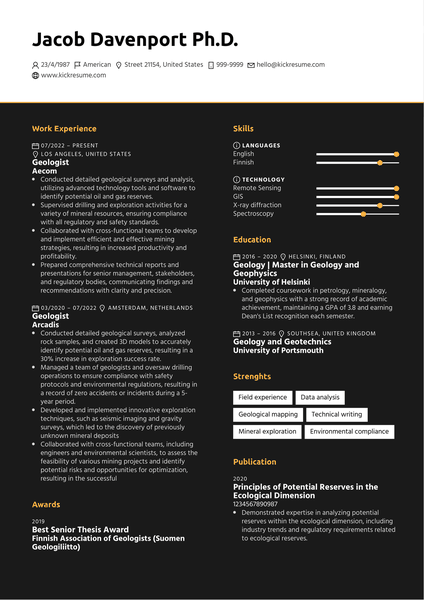

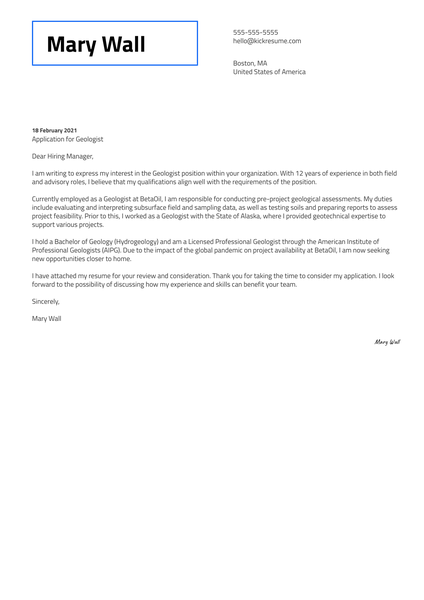
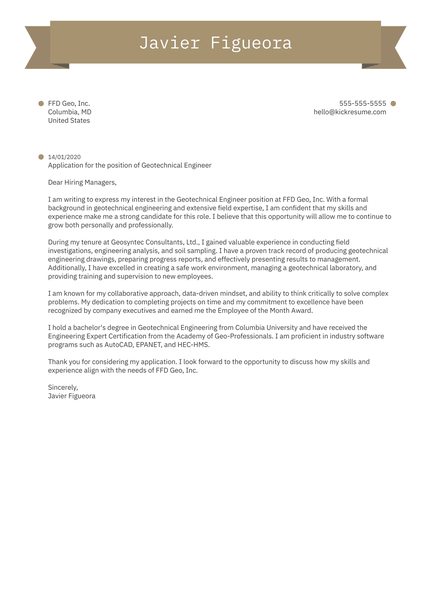

![How to Write a Professional Resume Summary? [+Examples]](https://d2xe0iugdha6pz.cloudfront.net/article-small-images/i-Profile.svg)
![How to Put Your Education on a Resume? [+Examples]](https://d2xe0iugdha6pz.cloudfront.net/article-small-images/i-Collage-Universities.svg)
![How to Describe Your Work Experience on a Resume? [+Examples]](https://d2xe0iugdha6pz.cloudfront.net/article-small-images/Experience.svg)


